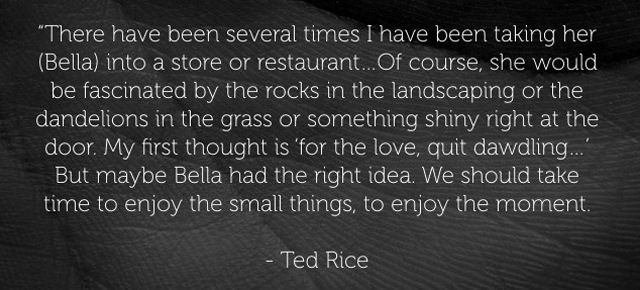In Everything
Ted Rice
“So whether you eat or drink or whatever you do, do it all for the glory of God.”
1 Corinthians 10:31
The Bible makes it clear that all of life is spiritual. The ancients knew this and lived accordingly, and it wasn’t until the Enlightenment that people decided that they should segregate their lives. People decided that religion might be important, but it belonged in one bin of their lives. I’ve long thought that putting religion or faith into a compartment means we really don’t believe it. If we look at religion as something we do on Sunday morning, sometimes a weeknight and maybe even an occasional retreat, we really don’t believe it.
Modern people too often think of their work, social, home, and religious lives as separate. We separate the sacred and secular. I think many people think of the secular as the real and the sacred as the mythical. Did God really do those miracles back in olden days? Certainly not, right? That was in the time where people were less sophisticated. Now we know that…
This is what CS Lewis called ‘chronological snobbery.’ The idea is that we are smarter and more sophisticated in our thinking. This is actually how we got the names “Dark Ages” and ‘Enlightenment.” The Enlightenment was where the light supposedly came back after the period of darkness. Who would rather live in the Dark Ages? Even the term “Middle Ages” is like this. The Middle Ages were the time between the light and glory of Rome and the flowering of modern society. Were things really rosy between 410 and 1700? Of course not, and neither are they now. When Jesus raised the dead, the people knew what dead was. Raising Jarius’ daughter was a miracle. The dead girl lived; it wasn’t a case of mistaken diagnosis.
Gregory the Great emphasized that everything can be an instrument of God’s communication with His people. This became the way of thinking until the scientific revolution. As the story goes, Martin Luther was caught in a storm and pledged to become a monk if God got him out of it. When Luther survived, he kept his vow. Did God send the storm to compel Luther to become a monk and then eventually start the Reformation? We should not be so quick to say no. After the scientific revolution, one of the prevailing beliefs became what might be called “philosophical materialism.” This belief highlighted the material aspects of the world and denigrated the spiritual. It seems only poets and mystics noticed the divine in the physical world.
Modern people have absorbed much Enlightenment thinking; some of it is fine, but other parts are potentially dangerous. Many modern people have given up on faith or think of it as something they do occasionally. The whole “spiritual but not religious” thing comes from this type of thinking. It basically means I have spiritual thoughts at times, but I don’t want to commit or submit to a religion. Thinking of the world as all there is or just a collection of objects deprives the world of its spiritual significance. Charlie talked about ‘thin places’ in some of his sermons. Thin places are where the veil between Heaven and Earth is thinner, where Heaven is closer to Earth. One I visited several years ago is Iao Valley State Park in Hawaii. We went there on our last day, on the way to the airport. It was fairly quiet and peaceful and gorgeous. Looking at that place as just a green spot with a giant rock would totally deprive it of its beauty and specialness.
When I became a father last November, I loved almost every minute of it. (And I still do!) I loved playing with Bella and watching her grow and learn, but I also loved taking care of her — doing the hard things. Changing her diaper, getting her to eat something, chasing her to get her to bed, comforting her when she had a fit (and she had plenty in the beginning) and all the other things one has to do that are less fun were chances to bond with her and to love her.
Looking at running errands with her as just something that needs to be done would have been the wrong approach. Sure, it takes longer to show her new things in the grocery store, to make a stop by the cookie counter to get a free cookie, but that enriches the experience for her and then also for us. When I change her diaper, I get to look her in the eyes, talk to her and have a couple minutes of Daddy-daughter time. Beth and I have developed a bath routine: she does bath, while I clean her room and pick up toys and books. Then I come in to finish getting her ready for bed, then we take her to bed where we do stories. Looking at bath time as a chore would cause us to miss special times.
There have been several times I have been taking her into a store or restaurant and wanted to get her in and settled, so I can start what I needed to do. Of course, Bella would be fascinated by the rocks in the landscaping or the dandelions in the grass or something shiny right at the door. My first thought is “for the love, quit dawdling. We’ve got stuff to do. Let’s get in here, buy the groceries and get home.” But maybe Bella had the right idea. We should take time to enjoy the small things, to enjoy the moment. So, when this happens, I try to suck it up and enjoy Bella exploring part of her world. Walking though the store, I can look at it as something that just has to be done, and try to maximize the efficiency of the trip, (a strong impulse in me) or I can try to make it fun for her. Maybe that means going back to look at the lobsters a second or third time. Maybe that means walking around the produce section more slowly (Bella loves looking at fruit; eating it is another story). Sometimes this means going to the cookie samples right away and walking back to what we need to get.
With Bella, there should not be “fun” times, “learning” times and “business” times. Every moment should be a time of fun and learning for her. It makes my life better and hers too. If we can do that for our kids, we can do it in our walk with God. In everything, we should find the spiritual, whether it is a good meal, a beautiful sunset or even just a cool breeze on a warm day.
Ted has been attending Imago for 7 years. He’s the proud father of 4 year old Bella and husband of Beth. He works at Samaritan Ministries telling the future with data and helping them run the ministry most effectively. He’s always up for a deep conversation about theology, church history, politics or mathematics over coffee.

